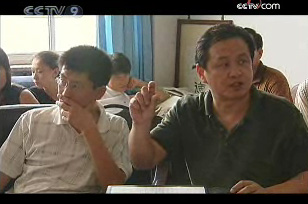Source: CCTV.com
09-24-2008 14:16
In January 2007, pioneers of co-operative housing schemes from across China were invited on to CCTV’s Dialogue Channel to discuss the success of co-operative housing in Wenzhou. When Yu Linggang had launched his co-operative housing scheme two year earlier, people in more than twenty cities had followed suit. But Yu Linggang had failed in Beijing, while in Wenzhou, where people had copied his example, they had succeeded. Co-operative housing was a hot topic again. But the focus this time was Zhao Zhiqiang in Wenzhou, instead of Yu Linggang.
 |
| Watch Video >> |
The programme opened Yu Linggang’s eyes. He had been the first to introduce the concept of co-operative housing in China. And even though the operational modes employed in different cities were different, the regional organizers had established links with one another. Yu Linggang, though, had never contacted anyone else.
 |
Lin Liren launched a co-operative housing scheme in Shenzhen. He had previously made a special journey to Beijing to consult Yu Linggang. However, he had been taken aback by Yu’s response.
Zhao Zhiqiang had had a similar experience. When he succeeded in getting the land at the end of 2006, he’d wanted to invite Yu Linggang to the press conference.
Zhao Zhiqiang asked someone to call Yu Linggang. But they were told Yu was busy. They finally reached him after three days.
It was perhaps because of these experiences, that Yu Linggang also came across as indifferent to the programme’s audience.
Everyone there was involved in co-operative housing schemes. But Yu Linggang refused to talk to anyone, except a lawyer from Britain. His excuse was that he had certain concerns about communicating with the other participants.
Many of the other pioneers had experience of business or real estate. They saw co-operative housing as not only a way of obtaining cheap housing, but also as a source of profit. Yu Linggang insisted he was different. He was pursuing a bigger dream through co-operative housing.
Yu Linggang’s Lancheng plan concerns urban planning. It envisages rail transit being introduced in cities, to reduce traffic accidents, traffic jams and vehicle pollution. Housing prices are reasonable, and every residential building is constructed by the residents themselves. They enjoy autonomy of management and keep the profits. As the owners of Lancheng, they lead a high quality life.
